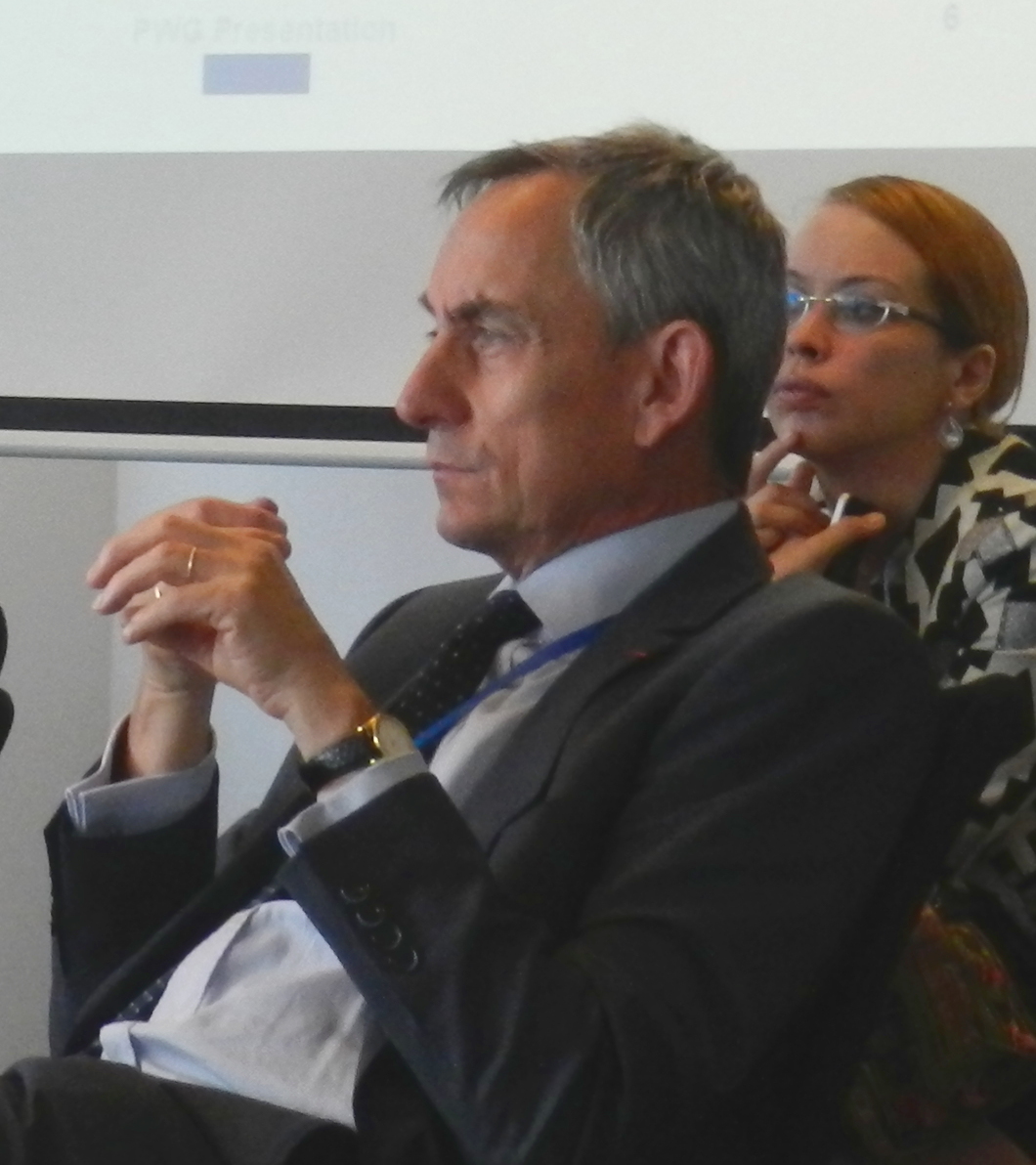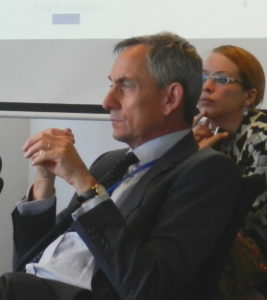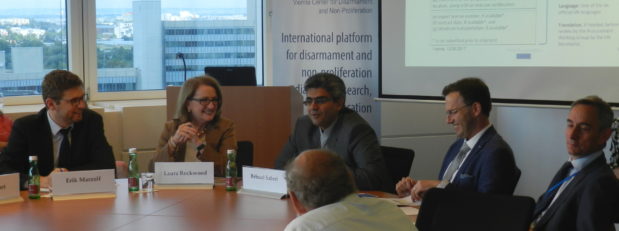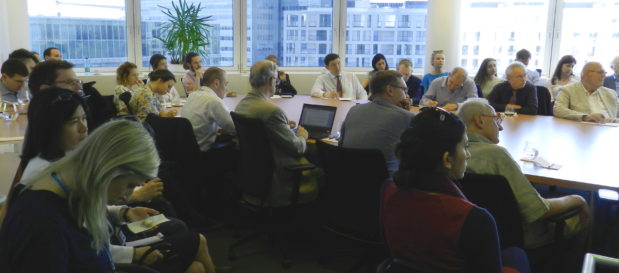

On 12 June 2017, the VCDNP, with support from King’s College London, organised an event entitled “JCPOA Procurement Channel: Status and Lessons Learned.” The event was chaired by Laura Rockwood, VCDNP Executive Director, with opening remarks by the Ambassador of the European Union (EU) to the International Organisations in Vienna Didier Lenoir. The speakers included officials actively engaged in the Procurement Channel from the UN Secretariat, the EU External Action Service (EEAS) and the Islamic Republic of Iran. The event was organised under the auspices of the VCDNP’s newly launched European Non-Proliferation and Security Initiative (ENSI); Ian Stewart, who directs the ENSI, also participated.
The event focused attention on an underutilised mechanism of the Joint Comprehensive Plan of Action (JCPOA) intended to ensure that trade in nuclear-related items is consistent with the principles and requirements of the agreement: the JCPOA Procurement Channel.
In her welcoming remarks, Laura Rockwood noted that, a year and a half into the implementation of the JCPOA, it was timely to consider whether the Procurement Channel was living up to its expectations. It was with this in mind that the VCDNP had organised the event.
The JCPOA Procurement Channel includes measures intended to ensure that while Iran is able to benefit from regular trade in the field of single and dual‑use items of nuclear relevance, such items cannot be diverted to support a nuclear programme in Iran inconsistent with the JCPOA. The Procurement Channel is run by the Procurement Channel Working Group (PWG) which is coordinated by the EEAS, and has seven participating States: United Kingdom; the United States of America; France; Germany; Russia; China; and Iran. The channel is designed to receive proposals from States interested in exporting goods to Iran. The PWG has 20 working days (extendable to 30 days) to consider the proposals on any one export good. The PWG operates by consensus and once their decision has been made it is sent to the Security Council for its final decision. The Security Council has five days to make its decision, which is then communicated to the proposing State in the form of a written letter.
In his remarks, Erik Marzolf, Senior Political Affairs Officer in the Security Council Affairs Division of the UN Secretariat, outlined that the JCPOA, was endorsed by the Security Council through resolution 2231 (2015), just six days after the agreement was reached by the E3/EU+3 and Iran. This resolution terminated the provisions of all previous Security Council resolutions on the Iranian nuclear issue and replaced prohibitions with certain restrictions, including on nuclear-related transfers to Iran.
He noted that resolution 2231 generated a distinct working mechanism which differs from that which existed during the sanctions period. In particular, there was no longer a dedicated committee of the Security Council charged with overseeing implementation. Instead, all tasks are directly undertaken by the Security Council and one of its members (on a rotating basis) acts as the facilitator. This year it is Italy, last year it was Spain. The specific role of the Secretariat is to support the facilitator and to report every six months to the Security Council on the implementation of resolution 2231. The Procurement Channel is a system derived and endorsed by the resolution and administratively supported by the UN Secretariat.
Mr. Marzolf noted that the Secretariat acts as the point of contact for States in submitting proposals to the Procurement Channel. He emphasized that the Secretariat is not involved in the substantive review of the proposals. States are encouraged to submit proposals through UN Missions in New York, using the templates available on the UN website in all six official languages. Once proposals have been received, the UN Secretariat is tasked with translating them into English before providing the proposals to the PWG for its consideration. Translations are usually completed within a 24 to 48 hour time period. The proposals are handled in the participating States capitals and the EEAS in Vienna serves as the coordinator. The duration of the review process ranges from 42 and 58 calendar days and to date averages 47 days. Once the outcome of the review is determined, the Secretariat informs the Member State of the decision of the Council. Mr. Marzolf indicated that all proposals submitted thus far had been processed in due time with consideration given to confidentiality.

Klemen Polak of the EU External Action Service and coordinator of the PWG noted that trade with Iran had entered a new era as a result of the JCPOA. The Procurement Channel, he said, had been quickly set up, with the necessary administrative items, such as templates, available as of Implementation Day. The Procurement Working Group has met every third week in Vienna since then and is the only working group under the JCPOA that has regular scheduled meetings.
Mr. Polak also mentioned the need to balance transparency with confidentiality, given that the information provided through the Procurement Channel could involve potential commercial sensitivities. In the spirit of transparency he highlighted that the PWG reports every six months to the Security Council on its review of the proposals. Mr. Polak concluded that to date a positive trend could be seen and it appeared that the Procurement Channel was working properly and that the PWG had provided sufficient information and guidelines for States to submit proposals. He also noted that of the proposals received to date, most included items on the dual-use list, which includes manufacturing equipment such as for the automobile industry. Though the Procurement Channel is working he recognized that it is still a new mechanism and more work needs to be done, especially on a national basis within each participating State.
Dr. Behzad Saberi, Counselor, Permanent Mission of the Islamic Republic of Iran to the International Organisations in Vienna who represents his country in the Procurement Working Group, reflected on the functioning of the Procurement Channel from an Iranian perspective. He noted that the Procurement Channel was one of the last measures to be agreed on in the JCPOA negotiations, due to mutually exclusive principled positions of different parties which were only brought to agreement through creative solutions and flexibility shown by all sides. He clarified that it had taken some time for Iran to set up the internal mechanisms necessary for the issuance of the end user certificates required under the Procurement Channel, and further explained that Iran had now established the Atomic Energy Organisation of Iran as the certifying authority for nuclear items and the Ministry of Industry, Trade and Mine as the certifying authority for non-nuclear civilian end users.
Dr. Saberi noted that the working mechanisms of the Procurement Channel were indeed set up effectively, and with a positive working spirit, but that, to date, too few cases had been referred through the Channel than expected. He elaborated on a number of reasons why he thought the use of the Channel had not yet yielded a greater output. These included, inter alia: (a) the considerable time that inevitably had been needed for setting up the arrangements and working methods related to the Procurement Channel in (and among) the Working Group, the UN, Iran and other participants of the Working Group. He mentioned that before the JCPOA Implementation Day there existed other more pressing priorities, and that therefore serious work on the necessary preparations for the Procurement Channel began only afterwards; (b) the novelty of the mechanism, meaning that States, industries (both in Iran and in the exporting countries), banks and financial institutions would require some time to become aware of the new possibilities and learn how to use it; (c) the fact that cases resulting from commercial transactions could naturally take some time to negotiate; (d) uncertainties among the private sector about re-engaging with Iran, as a result of the “shenanigans, sabotages and actions” by certain governments and interest groups who have retained their mind-set of sanctions and pressure; and (e) the fact that the appetite on the demand side seems to be less than expected. In this regard he highlighted that, for a country that had been under sanctions for a number of years, industries had had to learn either to indigenize the needed technology and become independent from foreign supply, or to modify their production lines to obviate the need for sanctioned items. Therefore, it will take time for such industries to gain trust in the efficiency and sustainability of this new network and to re-structure their planning to include items that may not have been available from abroad before the JCPOA. In his final remarks, he stressed the need for the Procurement Channel to be seen as available to all and as a reliable mechanism. In building this trust, more proposals could filter in through the channel in the future.
The overall sense from the three speakers was that the mechanisms were well‑established but underutilised. Ambassador Lenoir Didier of the EU Delegation in Vienna described the JCPOA as a bright force in an uncertain era and commented that the improving Iranian economy was a positive sign for the JCPOA’s viability. Nonetheless, the JCPOA’s challenges were noted. Ambassador Lenoir highlighted that the JCPOA – and the Procurement Channel in particular – was a technically complex and politically sensitive agreement, which required daily engagement among officials. All speakers noted the positive trend of the channel but also were not blind to the current shortfalls. However, the common belief that the JCPOA and the Procurement Channel are a success and in the best interest of all prevailed, and the speakers highlighted their own entities serious commitment to achieving the results defined in the agreement.

During the discussion period, the question of whether the Procurement Channel was necessary was raised. It was suggested that the Procurement Channel provides a useful additional mechanism for all parties to maintain confidence that Iran, and the other members of the E3/EU+3, are maintaining their commitments to the JCPOA. Further, it was suggested that, given broader geopolitical uncertainties, such additional confidence building measures would be useful in maintaining the JCPOA in the years ahead.
Another participant emphasized the technical nature of the Procurement Channel process, highlighting that the Channel only looks at the technical aspects of the mechanisms and proposals. As long as proposals are consistent with the JCPOA and resolution 2231, there is no reason why such proposals should not be approved. Referring to the 10 year timeframe for the Channel, the participant noted that little outreach could be done in such a short period. Thus, in encouraging States to submit proposals, it is important to recognize that no one State will be “black listed” or shunned should a proposal be denied, but rather the State would be encouraged to re-submit a proposal that is within the technical guidelines defined in both the JCPOA and resolution 2231 so that it could be accepted by the Procurement Working Group and the Security Council.
In concluding, Ian Stewart observed that mechanisms like the Procurement Channel would help to sustain the JCPOA over the next decade, but that it was incumbent on the E3/EU+3, Iran and other parties to secure a longer-term resolution of the issues that the JCPOA sought to address. He noted that, with the newly launched ENSI at the VCDNP, the Center hoped to play a useful role in this context through the organisation of further follow-on events and activities.
More information on the Procurement Channel can be found here.
This event was also featured on the EEAS website here.
By continuing to use the site, you agree to the use of cookies. more information
The cookie settings on this website are set to "allow cookies" to give you the best browsing experience possible. If you continue to use this website without changing your cookie settings or you click "Accept" below then you are consenting to this.